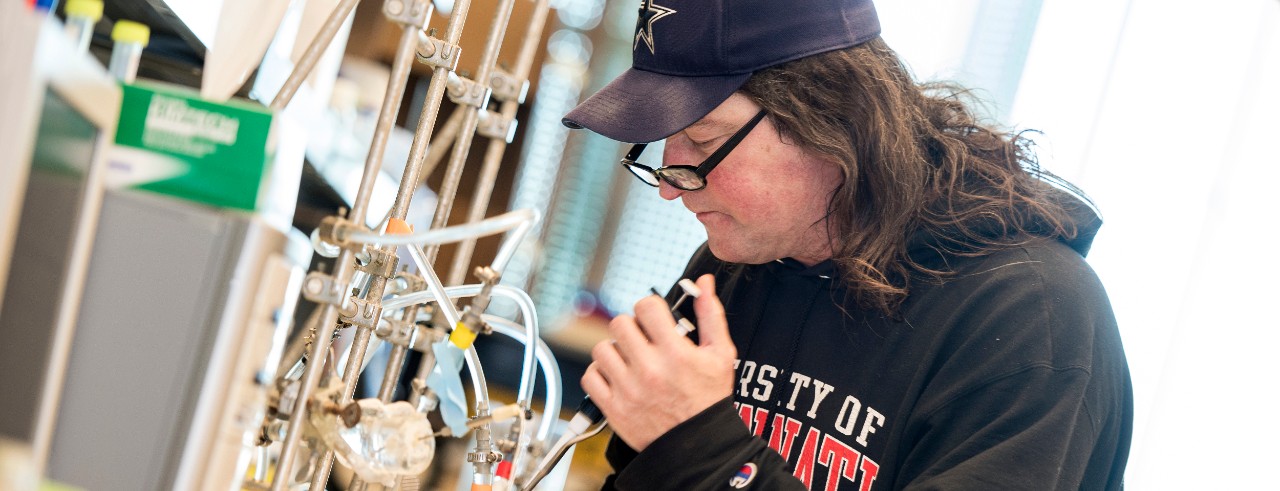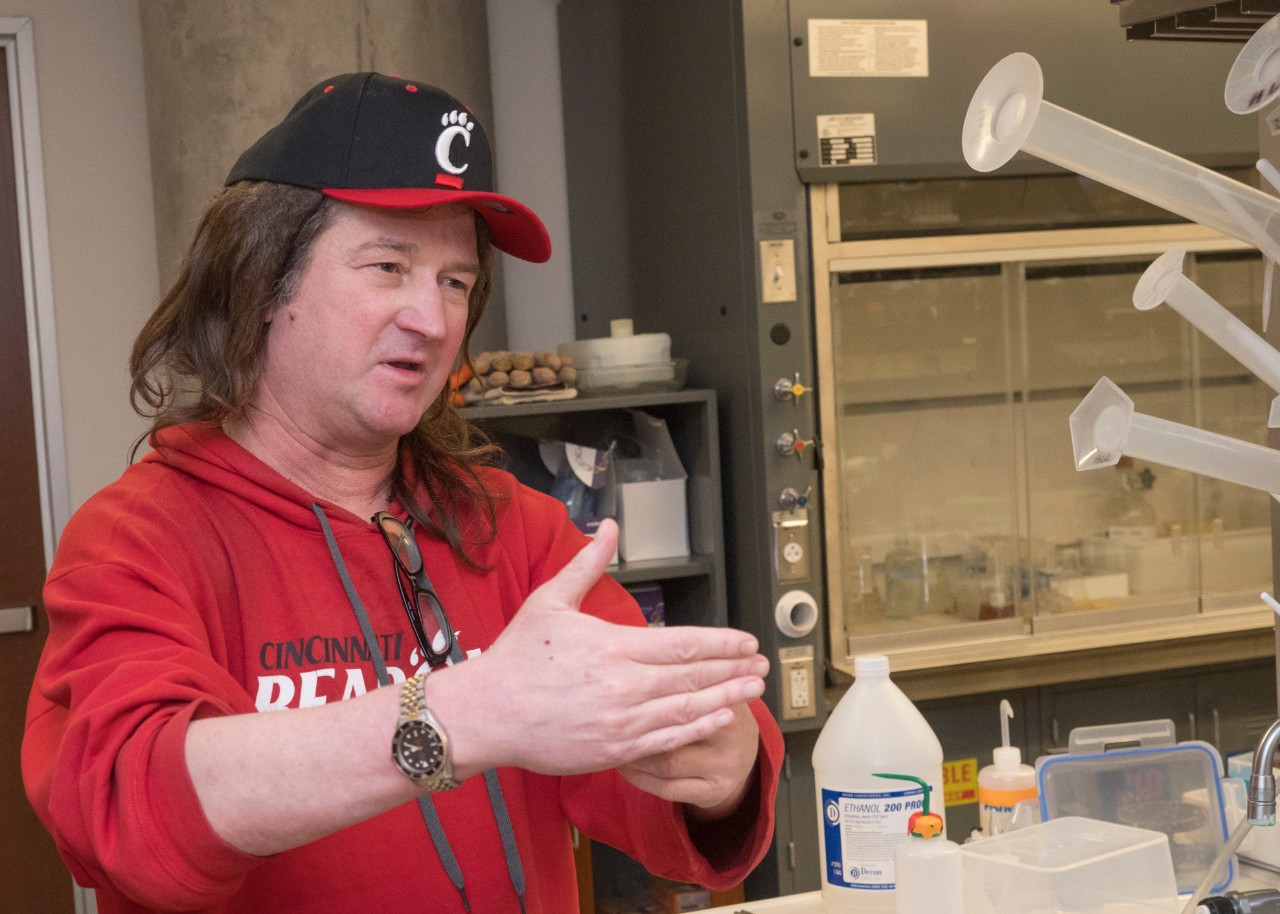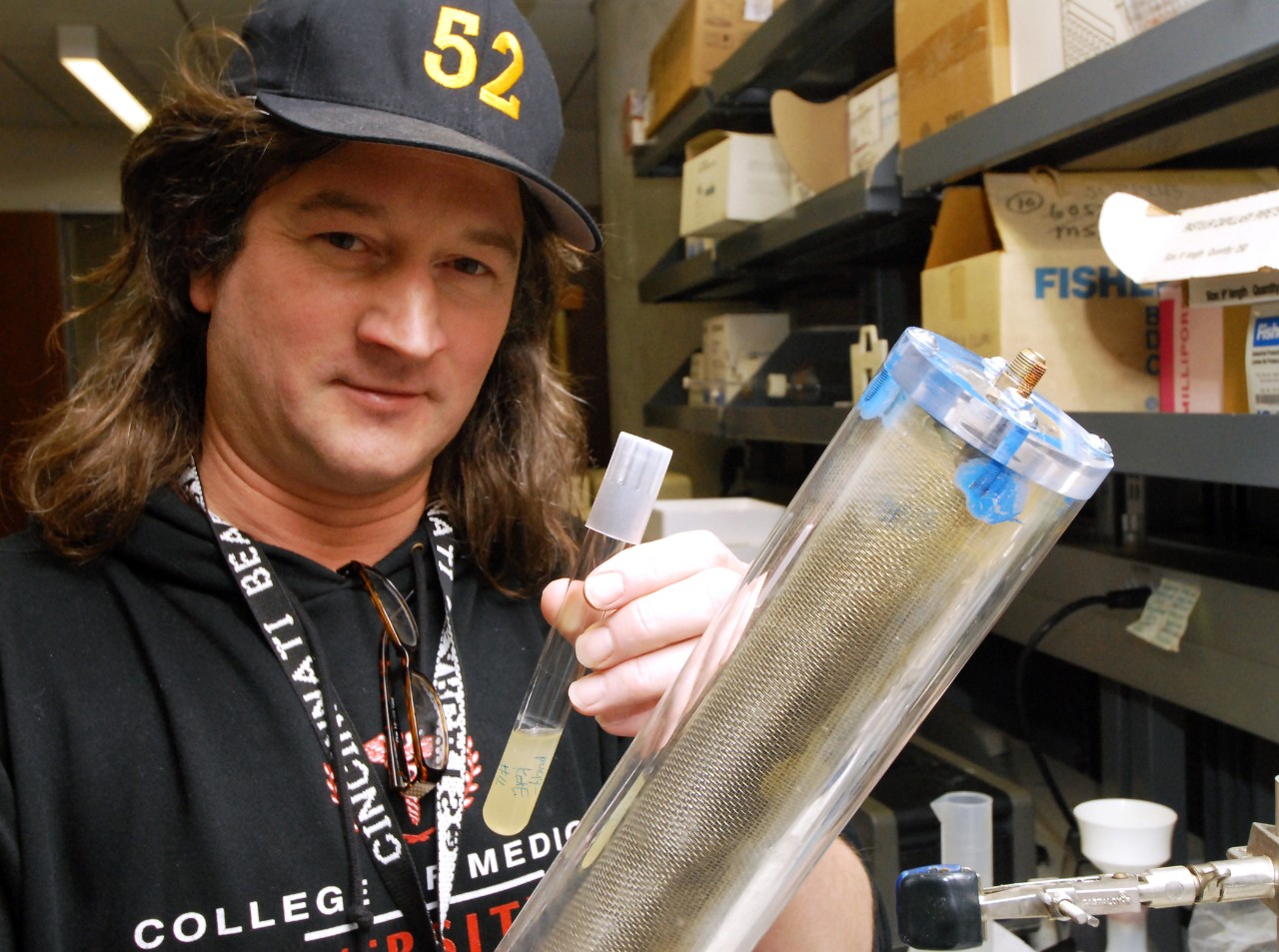
Innovative microbiologist Dan Hassett dies unexpectedly
Known for his cystic fibrosis research, unorthodox style and Sinatra songs
Dan Hassett, PhD, a longtime faculty member and researcher in the University of Cincinnati Department of Molecular Genetics, Biochemistry and Microbiology, died unexpectedly Thursday, April 27. He was 63.
A familiar figure around the College of Medicine, Hassett rarely wore a lab coat, instead, he frequently sported a hoodie and cut-off jeans with his familiar shoulder-length hair flowing from underneath an assortment of baseball caps. Occasionally, the cap read “FIGHT CF,” referring to cystic fibrosis, the focus of his research.
Hassett was an indefatigable supporter of CF research. Not only did he achieve significant research developments in the pathogenesis of Pseudomonas aeruginosa, in particular its role in CF, he would often raise money for CF research by singing at events and fundraisers, belting out Frank Sinatra tunes. He also would auction his “Fight CF” hats to raise additional dollars for research.
“Dan was one of a kind, and he was totally dedicated to his science and his research,” says Michael Lieberman, PhD, professor and chair of the Department of Molecular Genetics, Biochemistry and Microbiology. “He was a unique character. He really enjoyed singing, and when he realized he could raise money, he did it more often.”

Dan Hassett, PhD, developed and patented AB569, a drug that targets antibiotic-resistant organisms and is a potential treatment for patients with cystic fibrosis. (Photo: Colleen Kelley/UC Creative + Brand)
Rhett Kovall, PhD, a colleague and collaborator of Hassett’s in Molecular Genetics, similarly recalled Hassett, who joined the UC faculty in 1993.
“Dan definitely marched to the beat of his own drummer. He was a bit of an outsider and unorthodox,” Kovall says. “But Dan was very passionate about science. It was everything to him above all else, so it was science all day and night. If you were collaborating with him on a project, paper or grant, you could expect to hear from him multiple times a day via email, text or phone. His energy and enthusiasm were contagious and it was fun to collaborate with him. While his ideas and hypotheses could be all over the place at times, I think he really was a very bright guy and talented scientist.”
Early in Hassett’s career, while he was a research assistant professor at the University of North Carolina, Chapel Hill School of Medicine, he was introduced to patients battling cystic fibrosis and saw the difficulties they faced from chronic breathing problems. He decided then that “it’s going to be my life’s goal to find a major treatment where we kill these nasty antibiotic-resistant bacteria” that affected CF patients, he explained during a 2018 interview for UC Magazine.
Hassett kept his promise. In March 2018 he was awarded patent No. 9925206, “Compositions and Methods for Treating Bacterial Infection,” for a drug called AB569 that targets antibiotic-resistant organisms. Hassett’s research found that AB569 kills virtually all pathogenic bacteria tested with no observed acquired resistance. The potential treatment for pulmonary infections was licensed to Arch Biopartners Inc., a Toronto-based biotechnology company, for which Hassett also served as a principal scientist.
“AB569 can be a global game changer and has the potential to positively impact lives around the world, and not just in airway-related infections,” Hassett said in 2018.
The drug, a combination of acidified nitrite and EDTA (ethylenediaminetetraacetic acid), was also found to enhance the healing of wounds in a variety of burn injuries. AB569 is now in clinical trials.
In preparation for being featured in an April 2018 Business Courier ad for the College of Medicine, Hassett commented on his unique approach to research and problem-solving.
“You want to be a game-changer. You want to have people doubt you when you come up with novel things,” Hassett said. “You want to take problematic microbial infections and make intuitive investigations into genetic and physiological issues associated with those infections and be able to potentially identify drugs that could beat those infections.”
His research with bacteria also led him to find a way to generate energy. Hassett was able to engineer bacteria to eat human waste without growing too much so they could donate their electrons to a conductive surface on an anode to start a circuit. Using the method, he was able to generate enough energy to power a lightbulb.
Lieberman says Hassett was “a very innovative scientist who looked at problems in a way different than other people did and he liked to attack things ‘outside of the box.’”

Dan Hassett, PhD, who died April 27, 2022, is remembered as having a larger-than-life personality and being totally dedicated to his research. (Photo: Colleen Kelley/UC Creative + Brand)
Melanie Cushion, PhD, senior associate dean for research at the College of Medicine, notes that Hassett “was uncompromising in many ways, but his science and innovations were not. He dedicated his life to his scientific pursuits and his passion will be missed by his colleagues and the field of microbiology.”
“Dan is known for his innovation and scientific achievements, but on a personal level, he was caring and thoughtful. His larger-than-life personality will be missed in the college,” she adds.
Hassett was committed to training young investigators and also gave high school students the opportunity to gain valuable experience by working in his laboratory.
“While Dan could rub some people the wrong way, which he was unapologetic for, he really did show compassion and caring for his trainees and really wanted the best for them,” Kovall says.
Nalinikanth Kotagiri, PhD, assistant professor at the James L. Winkle College of Pharmacy, frequently collaborated with Hassett, receiving numerous federal grants and co-authoring many publications.
“Dan was one of the first collaborators I had the pleasure of working with,” Kotagiri says. “If there was someone who combined the child-like enthusiasm for new ideas with the wisdom of a seasoned researcher, it was Dan. He was always optimistic and pushing to explore new frontiers. Sometimes it was hard to play catch-up, even as a junior investigator.”
Kotagiri says that that despite Hassett’s occasional hospitalizations during the last six months, he would still receive phone calls from him to discuss their projects, progress and new ideas they could pursue once he was out of the hospital.
Hassett was awarded six patents for his research and has several patents pending. He was the principal investigator or collaborator on projects that received more than $12.1 million in funding during his career at UC.
In 2016, UC presented him with the Emerging Entrepreneurial Achievement Award and two year later he received the Established Entrepreneurial Achievement Award. Last year he was named to a list of the world’s top 2% most cited scientists. He also served on the Scientific and Medical Advisory Board of Tauriga Sciences, Inc., was co-founder and chairman of the Scientific Board of Pilus Energy, and was co-founder and chief scientific officer of Epiphany, Inc.
A native of Rochester, New York, Hassett received his doctoral degree in microbiology and enzyme biochemistry in 1987 from the State University of New York College of Environmental Science in Syracuse. After serving as a postdoctoral fellow at Duke University, he joined the faculty at the University of North Carolina. He came to the College of Medicine in April 1993 as an assistant professor and was named a professor in 2008.
Hassett, who is survived by eight brothers and sisters, continues to help research and medical education.
“His brother told me that he donated his body to science, so he’s continuing to help even after his death,” Lieberman says.
Details on services for Hassett are not yet available.
All photos of Dan Hassett, PhD, were taken by Colleen Kelley/UC Creative+Brand.
Related Stories
UC researcher launches app to connect patients to lifesaving...
May 7, 2025
A cardiologist and researcher at UC’s College of Medicine joined the Venture Lab at the 1819 Innovation Hub to launch High Enroll, an app that links clinical trials with willing participants.
CCM welcomes opera director and alumnus Jose Maria Condemi to...
May 5, 2025
UC College-Conservatory of Music Dean Pete Jutras has announced the appointment of Jose Maria Condemi, MFA, as CCM's new Associate Professor of Opera. His faculty appointment officially begins on Aug. 15, 2025. Condemi has been a director and producer of opera and theater of exceptional artistic quality for over two decades, both in the United States and internationally. His work encompasses a diverse range of styles and periods, consistently lauded for its theatrical sophistication, distinct visual sensibility and innovative approach.
The burning river that fueled a US green movement
May 5, 2025
An article by the BBC takes the reader back to the late 18th and 19th centuries, when US prosperity was defined by the industrial revolution, a time with little regard for the pollutants that came with industrial expansion. UC's David Stradling, professor of history, cited as expert source in the article.
